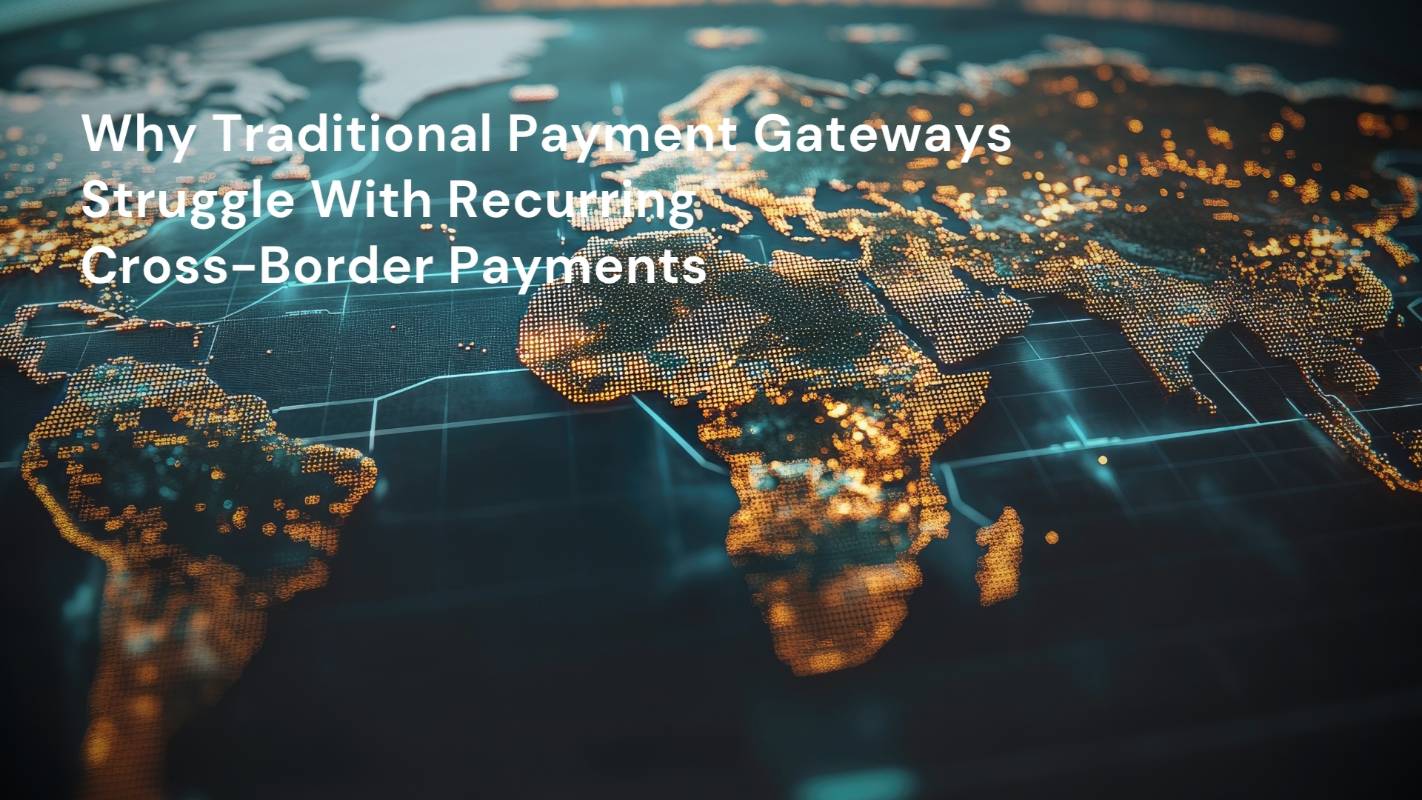Traditional payment gateways serve as the technological intermediary that facilitates transactions between consumers and merchants, enabling the acceptance of card payments and other transaction types. However, for businesses managing recurring cross-border payments, these systems often encounter specific and significant challenges.
Definition and functionality
A traditional payment gateway functions by encrypting sensitive client information, such as credit card numbers and personal data, to ensure secure transmission between merchants and banks. Upon initiating a payment, the gateway captures transaction details and forwards them to the respective financial institution for authorisation. Once authorisation is granted, the transaction is completed, and funds are transferred from the customer’s account to the merchant’s account. This process typically takes a few days for settlement, depending on the banking institutions involved.
Common limitations
While traditional payment gateways offer a reliable service for many businesses, they experience considerable limitations, especially for cross-border transactions:
- High fees: Transaction fees can be substantial, particularly for international payments. These fees often include cross-border costs, currency conversion charges, and service fees from each involved institution.
- Slow processing: Traditional methods may require several days for transactions to clear and settle, leading to delays in cash flow and inadequate customer experiences.
- Complicated regulations: Each country has specific regulations governing financial transactions. Exploring these can prove cumbersome and time-consuming for you.
- Account restrictions: Payment gateways may impose limits on transaction amounts that can hinder businesses, especially those dealing in high-value goods and services.
- Fraud risk: Increased risk of fraud exists with traditional systems, especially when dealing with cross-border payments, due to security inconsistencies across different regions.
These limitations contribute to the difficulties businesses face when managing recurring payments in a global market. Innovative solutions, such as Bitpace’s crypto payment gateway, present a viable alternative by addressing many of these barriers effectively.
Challenges of recurring payments
Recurring cross-border payments present significant obstacles for businesses utilising traditional payment gateways. These challenges impede the efficiency and effectiveness of payment strategies.
Customer retention issues
Customer retention is strained by various factors in the payment process. A lack of transparency emerges as a prominent concern. Customers often remain unaware of payment status or expected settlement timelines, fostering mistrust and dissatisfaction. High and unpredictable transaction fees also contribute to a poor customer experience. When costs fluctuate unexpectedly, customers may reconsider their loyalty, seeking more reliable options. Businesses must prioritise clear communication regarding fees and processes to improve customer retention. Providing visibility into transactions cultivates trust, an essential factor for maintaining recurring revenue streams.
Fraud and chargebacks
Fraud and chargeback challenges exacerbate the complexities of recurring cross-border payments. Cross-border transactions inherently possess elevated risks due to multiple jurisdictions and financial institutions involved. As a result, businesses face a higher likelihood of fraudulent activities, leading to potential financial losses. Resolving chargebacks presents another hurdle. The intricate nature of cross-border payments complicates the chargeback process, often resulting in prolonged disputes. These disputes not only incur extra costs but can also damage reputations. You can effectively mitigate these risks by integrating a robust payment solution, such as Bitpace. Bitpace’s advanced encryption and authentication tools significantly improve transaction security, safeguarding sensitive information and providing peace of mind. By embracing secure methodologies, you can reduce fraud risk while fostering trust among your customers.
Cross-border payment complexities
Managing cross-border payments presents businesses with numerous challenges, particularly when it comes to traditional payment gateways. Their reliance on correspondent banking networks often results in slow processing times, multiple intermediaries, and a lack of transparency, all of which complicate the payment process for recurring transactions.
Currency fluctuations
Currency fluctuations create significant risks for businesses making recurring payments across different currencies. Exchange rates can vary dramatically between payment intervals, introducing unpredictability in costs and revenue recognition. For instance, if you agree to a payment amount based on a specific exchange rate, any changes before settlement can lead to financial losses. Many businesses find it necessary to utilise sophisticated foreign exchange hedging tools or maintain multi-currency accounts to mitigate these risks. However, traditional payment gateways frequently lack these integrated features, making it difficult for you to manage multi-currency payments effectively.
Regulatory and compliance challenges
Each country has its own regulations governing cross-border payments, including anti-money laundering (AML) and know your customer (KYC) requirements. Exploring these regulations becomes particularly challenging with traditional payment gateways due to the constantly evolving legal world. You may encounter complications, especially in emerging markets with limited payment infrastructure and regulatory uncertainty. These obstacles can hinder the timely transfer of funds and create barriers to seamless recurring transactions. Consequently, traditional gateways struggle to keep pace with these requirements, which hampers their ability to facilitate efficient cross-border payments.
The evolving landscape of payment solutions
Modern payment challenges necessitate innovative approaches. Many companies seek enhanced efficiency and cost-effectiveness while managing recurring cross-border payments. Traditional systems struggle to meet these demands, prompting the rise of contemporary alternatives.
Emergence of modern alternatives
Various fintech platforms supply integrated solutions tailored to cross-border transactions. These innovations provide end-to-end tracking and automated reconciliation, which simplifies the management of payments. With localised payout options, businesses gain the advantage of convenience and efficiency. For example, services like Bitpace’s crypto payment gateway enable you to facilitate transactions in multiple cryptocurrencies, offering a seamless experience for both merchants and customers.
Another significant benefit arises from eliminating exchange rate volatility. Crypto-based solutions, for instance, can offer fixed conversion rates or stablecoin options, which stabilise your costs. Furthermore, straightforward integration with existing systems allows for an effortless transition to a new payment infrastructure. Continuous updates from these providers ensure compliance with the latest regulations, reducing your liability and operational risks.
Integration with global payment systems
Seamless integration with global payment networks forms the backbone of recent advancements in your payment experience. New platforms utilise APIs for effortless connectivity to multiple payment systems and currencies. This integration reduces reliance on correspondent banks, which historically have slowed down the settlement process. By minimising these delays, businesses can ensure timely payments that improve customer satisfaction.
Another important aspect involves receiving real-time updates on transaction status. With improved visibility into payment flows, you can effectively manage cash flow and reconcile accounts. Providers like Bitpace utilise advanced technologies to combine transparency with enhanced security, establishing trust between you and your customers.
Adopting these modern solutions not only streamlines your payment processes but also positions you ahead of competitors, allowing for greater market agility. Ultimately, adapting to these advancements fosters strong relationships with international customers while optimising transaction management.
Conclusion
Exploring the complexities of recurring cross-border payments requires a shift away from traditional payment gateways. As you’ve seen, the limitations of these systems can hinder your business growth and customer satisfaction. Embracing innovative solutions like crypto payment gateways not only addresses the challenges posed by high fees and slow processing times but also enhances security and transparency.
By leveraging modern fintech platforms and integrated solutions, you can streamline your payment processes and foster trust with your international customers. This proactive approach not only streamlines your payment processes but also positions you for greater market agility, fostering stronger relationships with international customers and driving your business forward in an increasingly competitive world.
Start accepting crypto payments with Bitpace’s crypto payment gateway
Get paid in Bitcoin, Ethereum, Litecoin, and many more established cryptocurrencies with Bitpace crypto payment gateway. Reach out now to start accepting crypto payments.





